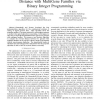284 search results - page 9 / 57 » On Reversible Combinatory Logic |
AMAI
2004
Springer
13 years 9 months ago
2004
Springer
We introduce the notion of combinatorial vote, where a group of agents (or voters) is supposed to express preferences and come to a common decision concerning a set of non-independ...
EVOW
2009
Springer
14 years 4 months ago
2009
Springer
Two independent evolutionary modeling methods, based on fuzzy logic and neural networks respectively, are applied to predicting trend reversals in financial time series, and their...
DAC
2010
ACM
14 years 1 months ago
2010
ACM
Reversible logic became a promising alternative to traditional circuits because of its applications e.g. in low-power design and quantum computation. As a result, design of revers...
CIBCB
2005
IEEE
14 years 3 months ago
2005
IEEE
— Hannenhalli and Pevzner developed the first polynomial-time algorithm for the combinatorial problem of sorting of signed genomic data. Their algorithm solves the minimum numbe...
TVLSI
2002
13 years 9 months ago
2002
Gate diffusion input (GDI)--a new technique of low-power digital combinatorial circuit design--is described. This technique allows reducing power consumption, propagation delay, an...

